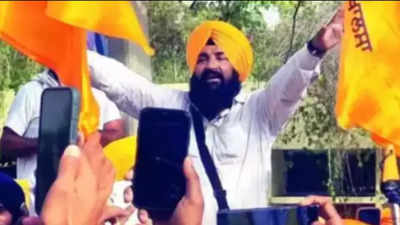- News
- City News
- amritsar News
- Sarabjit Singh Khalsa’s grandfather, mother had won parliamentary elections in 1989
Trending
Sarabjit Singh Khalsa’s grandfather, mother had won parliamentary elections in 1989
Sarabjit Singh, son of Beant Singh, the assassin of ex-Prime Minister Indira Gandhi, is part of a family with a political legacy. Both his mother and grandfather had served in the parliament together in 1989.

Sarabjit Singh Khalsa
BATHINDA: Sarabjit Singh, son of ex Prime Minister Indira Gandhi’ assassin Beant Singh is not the first from the family to reach the corridors of power but earlier his mother and grandfather both had reached the iconic parliament building together in 1989.
Both father in law Baba Sucha Singh and daughter in law Bimal Kaur Khalsa together had won the Lok Sabha elections as candidates of Shiromani Akali Dal United led by IPS officer turned politician Simranjit Singh Mann respectively from Bathinda and Ropar parliamentary constituencies.As Beant Singh was regarded as a martyr of Sikh qaum, both his wife and father were approached by the Mann led party and both had agreed to contest from different constituencies.
After army attack on Golden Temple, killing of India Gandhi and subsequently killing of Sikhs in Delhi and elsewhere, Punjab was passing through turbulent times. During and after the fall of Akali Dal government led by Surjit Singh Barnala in June 1987 for the central government not transferring Chandigarh to Punjab as per Punjab accord (known as Rajiv-Longowal accord) inked on July 24, 1985, non fulfilment of other Punjab demands and operation black thunder carried out in Golden Temple during Barnala government.
Under such circumstances when elections were announced in November 1989 there was fear psychosis in Punjab and Simranjit Singh Mann, who had resigned from IPS in protest against operation Blue Star, and was lodged in Bhagalpur Central Jail in Bihar, rose as a big leader. Akali Dal led by Simranjit Singh Mann contested the elections and became the largest party in Punjab.
Her victory margin was second highest in Punjab after party leader Simranjit Singh Mann, who had won by 4,80,417 votes from Tan Taran parliamentary constituency (later named as Khadoor Sahib) even as he had contested the elections while lodged in Bhagalpur central jail in Bihar. Mann was arrested in connection with the killing of then Prime Minister Indira Gandhi, who was assassinated by Beant Singh (Sarabjit Singh’ father) and Satwant Singh at her residence in Delhi on the morning of October 31, 1984.
Turbulent times continued for a long in Punjab and the assembly elections in Punjab to be held due to held on June 21, 1991 were postponed a day earlier. Later these elections were held in 1992 when less than 24% polling was recorded as even Akali Dal had boycotted these elections.
Both father in law Baba Sucha Singh and daughter in law Bimal Kaur Khalsa together had won the Lok Sabha elections as candidates of Shiromani Akali Dal United led by IPS officer turned politician Simranjit Singh Mann respectively from Bathinda and Ropar parliamentary constituencies.As Beant Singh was regarded as a martyr of Sikh qaum, both his wife and father were approached by the Mann led party and both had agreed to contest from different constituencies.
After army attack on Golden Temple, killing of India Gandhi and subsequently killing of Sikhs in Delhi and elsewhere, Punjab was passing through turbulent times. During and after the fall of Akali Dal government led by Surjit Singh Barnala in June 1987 for the central government not transferring Chandigarh to Punjab as per Punjab accord (known as Rajiv-Longowal accord) inked on July 24, 1985, non fulfilment of other Punjab demands and operation black thunder carried out in Golden Temple during Barnala government.
Under such circumstances when elections were announced in November 1989 there was fear psychosis in Punjab and Simranjit Singh Mann, who had resigned from IPS in protest against operation Blue Star, and was lodged in Bhagalpur Central Jail in Bihar, rose as a big leader. Akali Dal led by Simranjit Singh Mann contested the elections and became the largest party in Punjab.
Sarabjit Singh’ grandfather Sucha Singh while contesting from Bathinda (SC) parliamentary constituency had got 6,12,103 votes and defeated his nearest rival by 2,07,380 votes. His daughter in law Bimal Kaur Khalsa (mother of Sarabjit Singh) while contesting from Ropar (SC) parliamentary constituency (later named as Anandpur Sahib) got 7,14,245 votes, which were maximum out of all 13 parliamentary constituencies in Punjab and had defeated her nearest rival by 2,30,576 votes.
Her victory margin was second highest in Punjab after party leader Simranjit Singh Mann, who had won by 4,80,417 votes from Tan Taran parliamentary constituency (later named as Khadoor Sahib) even as he had contested the elections while lodged in Bhagalpur central jail in Bihar. Mann was arrested in connection with the killing of then Prime Minister Indira Gandhi, who was assassinated by Beant Singh (Sarabjit Singh’ father) and Satwant Singh at her residence in Delhi on the morning of October 31, 1984.
Turbulent times continued for a long in Punjab and the assembly elections in Punjab to be held due to held on June 21, 1991 were postponed a day earlier. Later these elections were held in 1992 when less than 24% polling was recorded as even Akali Dal had boycotted these elections.
End of Article
FOLLOW US ON SOCIAL MEDIA











